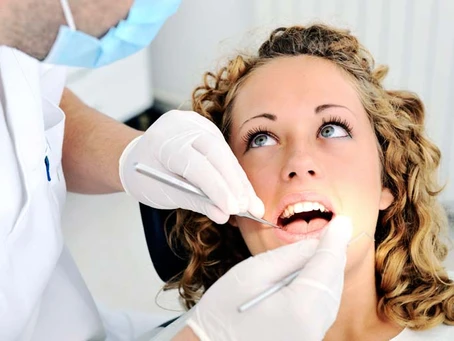Everyone knows that sugar is bad for your teeth. But there are so many other threats to your oral health that you may be less aware of. In this 2-part post, I will highlight the key players when it comes to mouth destruction so you can be on guard!
#1: Sugar Yes, we must talk about this first because it really is important to understand the mechanism of tooth decay. For a tooth to get decay, several factors must all be present at the same time. The first is bacteria. Thanks to our parents, we all were inoculated with oral bacteria at a pretty young age. It is impossible to avoid this (good luck never sharing a utensil, food or beverage with your kid, let alone not kissing their sweet face!). So we just have to deal with the consequences. There are many different species of bacteria in our mouths, and some of us have higher concentrations of the more aggressive strains than others. These bacteria are fueled by simple carbohydrates, forming a sticky substance called plaque and producing acid as a byproduct of their metabolism. This is the real offender. Over time, if the sticky plaque remains on your teeth, the acid will start to dissolve the enamel of your tooth. If not halted early, this process progresses past the enamel, deeper into your tooth. The worst case scenario is that the destruction makes its way into the nerve of your tooth, carrying the bacteria with it. Once the nerve is infected, a raging toothache can ensue. Not fun. This destruction can also cause teeth to break since their structural integrity is undermined by decay. The solution to the sugar problem is multi-fold. Avoiding simple sugar in general minimizes the amount of damage that is possible (don’t we all wish that were easy?). Keep in mind that the majority of common foods and beverages in our modern American diets are laden with sugar. Reading nutrition labels is necessary to really know what you are eating/drinking. Having good hygiene also mitigates risk from sugar because removing the plaque from the surface of the tooth halts the process. Brushing is the primary means of achieving this, but since the bristles of a brush can only reach so far, it is also necessary to clean in between your teeth with something else. Dental floss, water flossers (like the Waterpik®) or smaller brushes designed to get in between your teeth will do the job. Yes, it’s a hassle to go to all this trouble, but it is worth the effort! You can also work to lessen the number of bacteria in your mouth. Antiseptic rinses aim to do this. Keep in mind that there are a lot of mouthwashes on the market, but only a few are truly antiseptic. You also must rinse with them for the prescribed amount of time at full strength to really do the job. Even so, there are places in the mouth that bacteria lurk that a mouthwash will never reach. Ask us friendly folks at Inspire Dental for more details!
#2: Parafunction This is a fancy word us dentists use to describe the activities the teeth and muscles of the mouth are engaged in that are not part of necessary function. At the most basic level, the function of the oral cavity is to start the digestive process by chewing food and breaking down carbohydrates with enzymes. Speech and breathing are other vital functions that the oral cavity plays a role in. Clenching or grinding your teeth are actions that are not accomplishing anything productive, so they are considered “parafunctional” activities. These habits can be very destructive to the TMJs, the muscles of the face, the teeth themselves, and even the gums and bone around the teeth. The really pesky thing about parafunction lies in the fact that it is quite often out of our control. Many of us do this while we are asleep. Some of us clench or grind our teeth when under stress (anyone who commutes up or down I-25 can relate!). The solution to this problem is complex. I wish it were simpler. One method for minimizing the wear and tear on the teeth and supporting structures is to use a mouth guard. (I’m not referring to the sports kind here – although those are also a great idea.) We often call them ‘night guards’ because they are typically worn while sleeping. They are made of acrylic and custom fitted to your teeth. A night guard serves as a layer of protection between the teeth so when you are grinding in your sleep, you’ll wear down the acrylic and not your enamel. It also takes the stress off of your muscles and joints so you’ll likely feel better when you wake up. I have also been reading lately about a strong connection between nighttime clenching/grinding and airway problems such as sleep apnea. It appears that when we are struggling to breathe, one response is to clench or grind our teeth. This means that a person who treats their sleep apnea may also be treating their parafunction issue. Now that’s really exciting for so many reasons!
#3 Abrasion Now I’m speaking to you overachievers. You know who you are! You assume that if a soft-bristled toothbrush does a good job, a hard-bristled one will work even better! You want to get in, get done, and get out when it comes to brushing, so you quickly and aggressively scrub your teeth. Or, perhaps you enjoy brushing a lot, you take your time, and do it 5 or 6 times a day. I can think of much better hobbies than this, and I’m a DENTIST for goodness sake! It’s super important to do a good job removing plaque from your teeth and gums, and this cannot be accomplished well in less than 2 minutes for most people. We also need to brush and floss with regular frequency for optimal results. But, you CAN overdo it, and the effects on your teeth are detrimental. I see patients all the time who are brushing with a medium or hard-bristled toothbrush, are pushing too hard, or using a less-than-ideal motion when brushing. The damage is very recognizable. You’ll experience gum recession and what we call “toothbrush abrasion” where areas of your teeth along the gumline are worn or notched out. This can often go hand in hand with parafunction (see #2). My recommendation is to use a soft-bristled toothbrush and a gentle circular motion. Save the hard bristles for cleaning grout! We are happy to demo the best technique for you at Inspire Dental. It truly is amazing how many of us adults never really learned the proper way to brush our teeth. Let’s fix that! The other thing to be aware of if you are prone to this sort of destruction is the type of toothpaste you use. Avoid baking soda or whitening toothpaste if you have gum recession or sensitivity. These products are more abrasive and will remove stains well, but can also do damage when used incorrectly.
That’s all for now….stay tuned for part 2 of “Weapons of Mouth Destruction.”
-Kari





